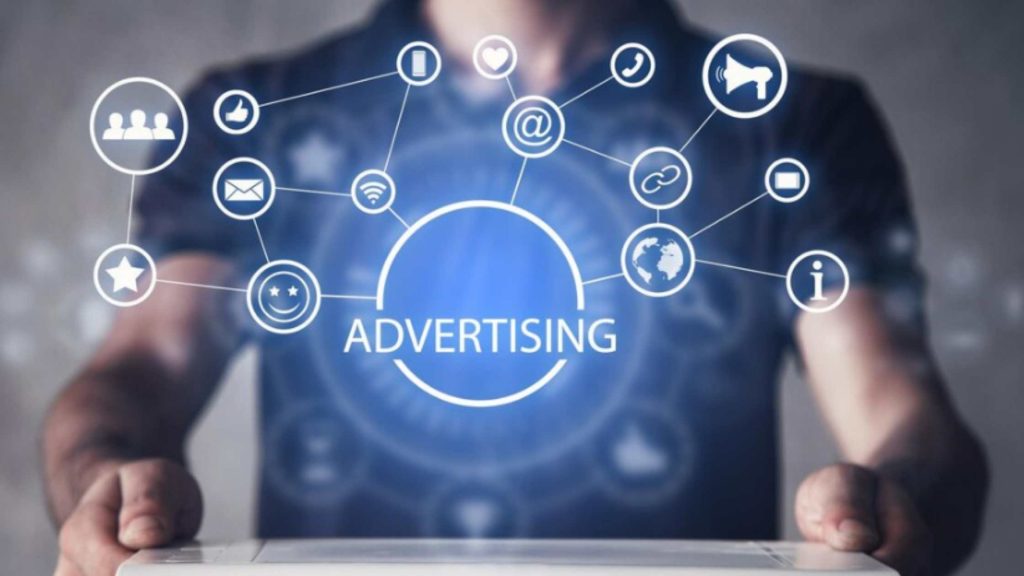Introduction
Ethical advertising is no longer a nice-to-have strategy; it’s a need-to-have business strategy. With the modern-day consumer becoming increasingly aware of where they direct their attention and money, they seek honesty, integrity, and values in every engagement. There is also an increasing demand among consumers for messaging that is transparent, inclusive, and socially responsible in all its practices.
Instead of manufactured narratives and over-hyped promises, fair advertising employs honest narratives to create authentic relationships with customers. It is, in other words, about marketing, offering products you can stand behind, not selling one product to clean one area of skin one particular way.
Today’s buyers don’t just want good products; they want to spend money with brands that stand for something meaningful. Good advertising does not just sell products but creates emotional loyalty, and by showing customers that your business has values, not just a profit margin. It lays the groundwork for that trust and a relationship of brand love that lasts.
In this blog, we’ll take a closer look at why ethical advertising fosters business longevity, the place of ethical marketing, and how fair advertising impacts long-term success. The new wave of values-based marketing begins here, and the impact is palpable.
What is Ethical Advertising?
This trust from a brand to its consumers has its foundations in good advertising. In a cluttered world of misdirection and sneaky marketing tactics, honest and transparent engagement isn’t just good to have but essential. Honest advertising: Is honest about what it is and isn’t, respects people, and acknowledges you are intelligent and independent enough to take that on board.
Good advertising does not emotionally manipulate, nor does it have to scare or shame people into doing something. It pushes companies to think about long-term financial benefits when they are putting messages out in society. This shift allows brands to build credibility that lasts.
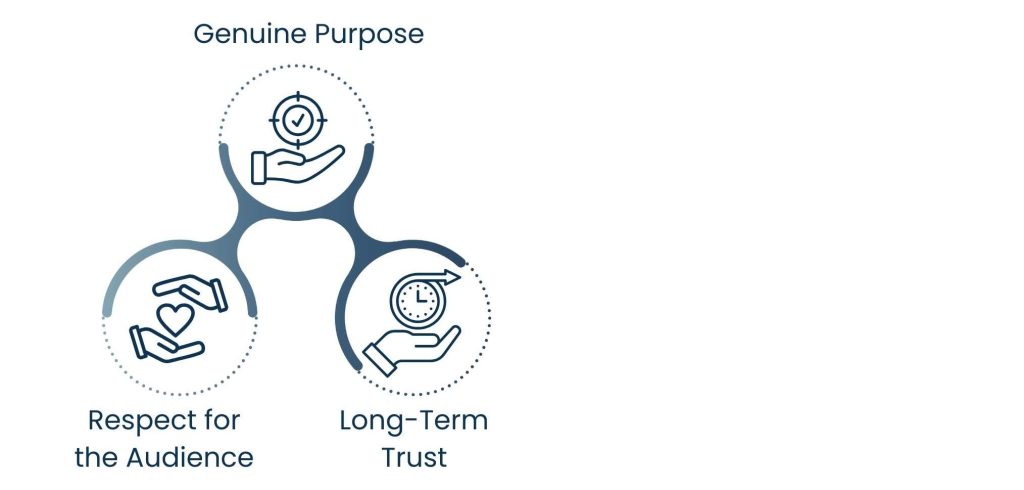
What Makes Advertising “Ethical”?
The purpose behind a campaign and the motivational messages make advertising ethical. It emphasizes that advertisers should focus on how something is said and why it’s being said.
Here’s what makes advertising ethical:
- Genuine Purpose: The intention behind any campaign should be clear and supportive. It should benefit society, not just manipulate emotions or exploit insecurities for profit.
- Respect for the Audience: Ethical messages should respect users’ emotions and treat them as intelligent and diverse individuals.
- Long-Term Trust: Brands with ethical intent aim to build relationships that last. Short-term gains lose integrity and accountability.
So, fair advertising with honest intent not only communicates clearly and inclusively but also ensures that the underlying motivation aligns with the public good, not just corporate interest.
Why Intent Matters in Ethical Advertising?
At the back of every genuine campaign is an honest and wholesome cause. Instead of encouraging impulsive purchases, ethical advertisers seek to:
- Educate the customer.
- Solve a real need.
- Promote sustainable choices.
- Build a values-driven relationship.
Ethical vs Traditional Advertising
Traditional marketing can depend on:
- Overpromising outcomes.
- Relying on urgency or guilt to motivate fundraising.
- Employing clickbait headlines.
- Exploiting insecurities.
While Ethical strategies promote fair practices by treating the customer as a partner, not a target. These practices align messaging with what today’s consumers care about: trust, purpose, and respect.
Also Read: Accounting Project Manager
The Significance of Ethical Advertising Now
It’s not optional or “nice-to-have” — it’s what will differentiate the brands that live on or in infamy, versus those that don’t. Clients are getting smarter and are more conscientious about the social and ethical implications of what they are buying. They are not buying products; they are buying into values.” A corollary: The act of a brand matters as much as the product or service for sale, with what it says, what it sells, and how well it treats its customers and the planet being inseparable from the stuff it is selling.
Attention to social justice, sustainability, and transparency brought in ethical marketing practices. Brands that demonstrate genuine commitment and shine through with real authenticity are rewarded in the long term by enduring loyalty and positive brand sentiment, and drive advocacy by consumers.

Ethical Advertising Meets the Public Expectations
Consumers can now easily check up on a company’s reputation and their policies and practices based on this blossoming digital transparency.
They want brands that:
- Have integrity in what they say.
- Take a stand for social issues that are close to their hearts.
- Provide clear, honest communication.
Brands that engage in honest advertising build trust, meaningful relationships for the long term.
Real Data Reflects the Shift
Numbers back up all the difference that fair advertising makes in purchasing behavior and loyalty:
- 70% of consumers would rather buy from brands that are aligned with their values.
- 76% of buyers indicate that a brand’s social and environmental practices affect their purchase decisions.
- 86% of users say that a brand’s transparency wins their trust.
- Ethical marketing inspires users to share, recommend, and defend the brand in public discussions.
- Flaws, like dishonest claims or cultural tone-deafness, can prompt an instant backlash and brand walkout.
Ethical Advertising Builds a Competitive Advantage
And beyond mitigation of risk, fair advertising would provide a significant competitive edge. Businesses that incorporate sustainability and a degree of transparency into their advertising are likely to be viewed as:
- Trustworthy and credible.
- Consistent with enduring social values.
- Human and approachable.
- More likely to drive advocacy and loyalty.
These aren’t merely marketing-puff positives — they’re business-operations positives.
Transitioning to an Ethical Mindset
Whether you’re a start-up or a well-established corporation, adding ethics to your brand messaging strengthens your reputation and builds lasting customer trust. Ethical communication shows your commitment to transparency, responsibility, and inclusivity.
Establishing trust through fair advertising practices
Advertising for good is based on a single core concept: trust. In a world where consumers are inundated with marketing noise daily in today’s skeptical marketplace, trust is a valuable commodity. Brands that advertise fairly earn more than just attention – they receive respect, trust, and long-term loyalty, because the relationship you have with customers is at the core of your business model.
A responsible storyteller follows fair advertising practices. They don’t manipulate the price, or change the truth. That authenticity satisfies 21st-century consumers who demand to be treated like partners, not just profit centers.

What Would Fair Advertising Practices Look Like?
Fair advertising is more than just staying out of trouble with false claims — it’s about communicating with integrity every step of the way. Marketers who use ethical marketing practice based on the equity framework usually do the following:
- No false or misleading statements or exaggerated claims.
- All product claims should be substantiated and truthful.
- Clear and transparent pricing.
- No hidden fees, obfuscated terms, or deceptive “limited-time” gimmicks.
- Honest presentation and representation of the product.
- Real images, real use results, and not over-enhanced shots.
- All disclaimers are evident and conspicuous.
- Keywords cannot be relegated to footnotes or packed behind risks.
- A respectful tone and inclusive language.
- No generalizations or offensive humour.
Fair policies create a positive image and lead to a high level of satisfaction and loyalty.
How Fairness Strengthens Customer Loyalty?
When a brand gives its customers the impression that fairness is a priority, they think:
- Respected and valued
They understand the brand considers them smart consumers, making informed choices.
- More at ease with their buys
Responsible messaging helps decrease buyers’ remorse and returns.
- Feel an emotional connection to the brand
Reciprocal respect is the basis of relationship marketing.
- Encouraged to refer others
Users’ more likely to recommend a brand they trust. By including sustainable advertising practices like transparency or environmental impact, brands go an extra step further in building trust and credibility, thus increasing referrals.
Also Read: Backend Development Services
Sustainable advertising practices and brand longevity
As consumers become increasingly politically and environmentally aware, brands are being held to account, as much for how they’re selling products as which products they’re selling. The inevitable result is the need for moral advertising in the 21st century. There are long-term benefits for honest advertisers.
Ethical advertising is founded on transparency and fairness, and sustainability takes it up a notch, injecting moral and ethical values into what we do, which, in addition to being good for the planet and for the welfare of society, and for future generations. Together, they create a solid base for brands to last the long haul.
Why Sustainability Matters in Advertising
In the current marketplace, consumers are eco-conscious and socially aware.

They want the brands they love to:
- Take environmental concerns seriously.
- Their campaigns, notes, and actions should reflect inclusivity and social justice.
- Choose to be responsible in production, packaging, and promotion.
- Disclose information about their supply chains and partnerships.
Brands that don’t live up to these values will be perceived as out of step or opportunistic. That’s why green advertising must be essential to a marketing strategy because if you do anything else, you’re going to be left behind.
Green logos or catch-phrases don’t convey an eco-friendly message. It is about reducing harm in the long term and doing some good for society and the planet.
Here is what Sustainable Advertising looks like:
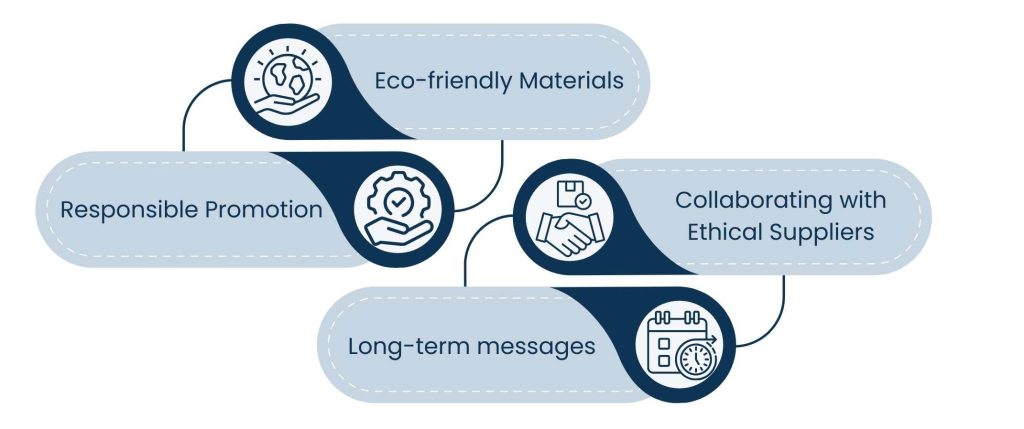
- Eco-friendly Materials: Use digital-first strategies that can reduce waste. You can still print, but use recycled materials and allow for biodegradable packaging.
- Responsible Promotion: Keep messaging simple. Inspire people to embrace minimalism whenever possible.
- Collaborating with Ethical Suppliers: Work only with fair and ecologically friendly suppliers. Transparent partnership generates trust.
- Long-term messages: Invest in brand stories that develop long-term promotions. It adds a uniform depth to the overall experience of the audience.
The Role Sustainable Advertising Plays in Brand Longevity

In advertising, sustainability isn’t just about image — it’s good for business:
- Generates stronger customer loyalty: Sensitive shoppers will return to brands that reflect their values.
- Raises brand equity: Brands that prefer eco-friendly practices enhance reputation, and customer advocacy.
- Attracts talent and partners: Employees and business partners want to be associated with brands that take their social and environmental responsibilities seriously.
- Timeless appeal: Sustainable messages resonate with this profoundly ever-changing world, that can make a brand timeless.
Ethical Advertising Meets Sustainability
There is no question that, in the two years since then, the rate of change in the confluence of ethics, sustainability, media, and infrastructure supporting moral advertising has only accelerated. When advertising debt is matched with commitment to sustainability, brands meet today’s expectations, not only that, but they claim a better tomorrow. Through eco-friendly advertising practices that focus on long-term value rather than short-term gain, businesses are also able to move their promotions in line with an integrated mission: something that customers and communities resonate with.
Brand success will be from here on out, the one that can find advertising that mirrors those 3Ps, gives purpose, instigates impact, and promotes fairness.
Mechanism of Ethical Advertising on Long-Term Growth
Ethical advertising is not only the right thing to do, but it is also a smart and sustainable strategy that directly adds to the growth of the brand in the long run. Consumer attitudes are shifting, as are expectations for trust and transparency, which says a lot, for better or worse, about whether to make or break a decision. Firms that integrate ethics in their ad campaigns are rewarded more than just a short burst of engagement; they lay the groundwork for long-term brand reputation.
Consistent, loyal, and organic growth.
Where the conventional approach may concentrate on conversions right now, fair advertising takes a longer-term perspective. “Create” in this context means relationship-building built on respect, common interests, and most importantly: relevance — i.e., it’s the principle that drives bottom-line business results over the long term.
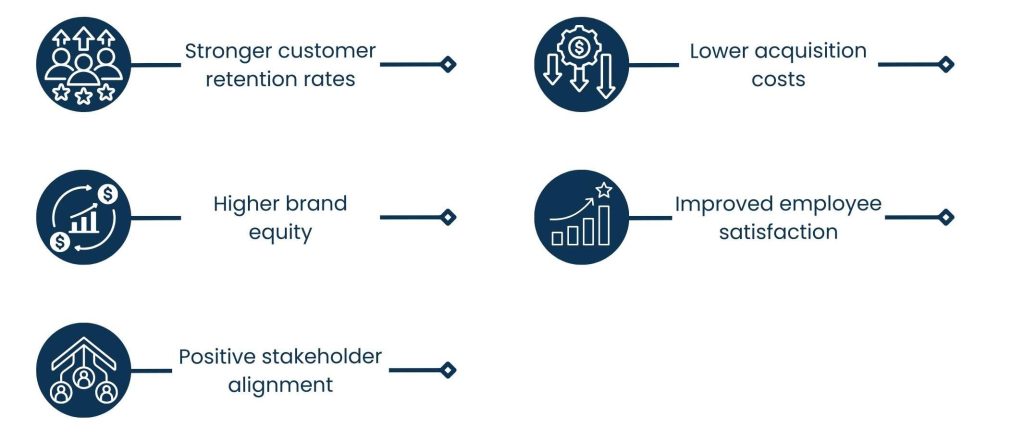
Business Benefits of Ethical Practices
When brands are responsible in the way they advertise and employ honest marketing tactics, the business benefits are undeniable:
- Stronger customer retention rates
Customers who believe in your values are less likely to switch, even in the face of rivals offering discounts.
- Lower acquisition costs
For ethical brands, word-of-mouth marketing, referrals, and loyal communities are essential and speak volumes and fight for you.
- Higher brand equity
When your brand credibility is strong, your perceived value is elevated, increasing your pricing power and the strength of your market position.
- Improved employee satisfaction
People want to work for brands that they can‘t wait to tell their friends about. Ethics make for strong morale and low turnover.
- Positive stakeholder alignment
Stakeholders, investors, partners, and regulators also prefer brands that comply with ESG (Environmental, Social, and Governance) standards.
These advantages add up to ethical marketing not only as a branding currency but as a growth trajectory for businesses built for qualities of sustainability and longevity.
Advertising Ethics Results in Sustainable Competitive Advantage
Unlike short-term drives where marketing is often aggressive, which makes its effects short-lived, ethical advertising helps in sustaining business. By investing in an authentic and principled legacy, brands keep themselves future-ready against changes in markets and the risks of reputation.
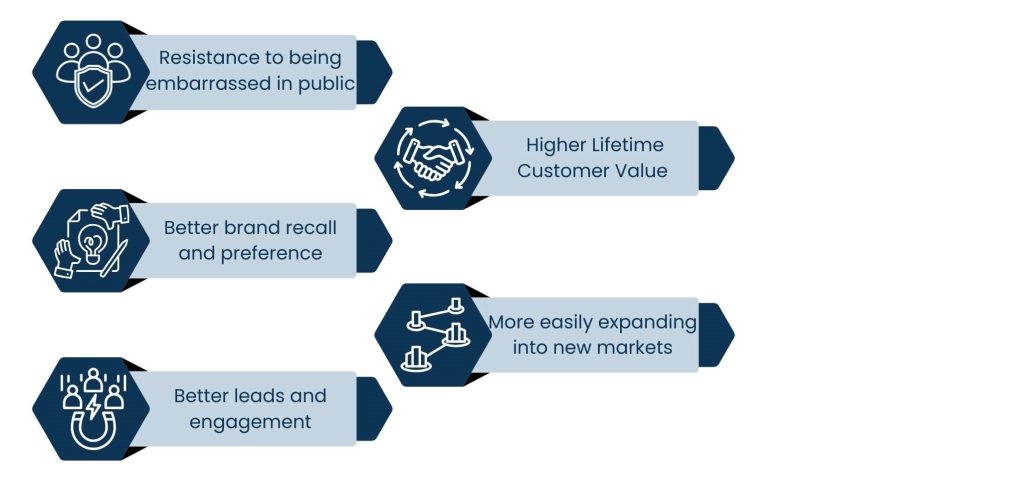
Here’s how:
- Resistance to being embarrassed in public: Ethical brands are more likely to survive a crisis because they have already earned public trust.
- Better brand recall and preference: People remember the brands that made them feel respected and seen, as opposed to manipulated and misled.
- Better leads and engagement: Those attracted to genuine messaging are a better match with your values and therefore more likely to decide to purchase.
- Higher Lifetime Customer Value: Returning buyers give you repeated purchases, respond to upsells, and become brand ambassadors.
- More easily expanding into new markets: Track record of accountability makes collaboration easier, or leaves opportunity to the purpose-driven sector/ demographic.
Sustainability and Ethics Drive Loyalty
Sustainable marketing efforts are also critically important for this issue. As general environmental and social consciousness deepens, brand footprints, packaging, and partner relationships are being closely considered by consumers. Ethical and humane advertising is being considered because sustainable messaging is a posture of commitment, not just compliance.
The alignment of the brand message with business ethics solidifies loyalty. Clients will have confidence in not just what you say…but how you do business.
The rewards of ethical ads are strategic and quantifiable in the long run. Whether it’s adding to the bottom line or increasing the bond between a brand and consumers, there’s no doubt that ethicality drives all elements of brand shaping. In the next post, we’ll explore how digital publishers can help spread ethical messages while maintaining authenticity and honesty.
Conclusion: Greater Loyalty Begins with Greater Values
Ethical advertising is more than a campaign strategy; it’s a brand philosophy that we need to live by. In a crowded marketplace, the line between winning and losing businesses often doesn’t come down to price or how good the product is, but the values they represent to their customers. For consumers today, the product isn’t enough anymore. They want brands that share their values, operate with transparency, and are accountable for their actions.
By incorporating ethical marketing strategies, sustainable advertising practices that value fair advertising practices into the DNA of your brand, you’re not just enhancing your messaging— you’re changing the way in which people associate themselves with liking and trusting your business. Advertising practices based on trust establish their roots in honesty, resulting in stronger loyalty, deeper engagement, and higher advocacy.
When your values match up with the values of your customers, you sell much more than a product or service — you sell your long-term support.
If you’re a brand with your heart and future in the right place, Tasks Expert can help you optimize and fluidify operations so your people can focus on what counts—delivering trust, respect, and value-infused experiences for your customers.
About Us
Tasks Expert offers top-tier virtual assistant services from highly skilled professionals based in India. Our VAs handle a wide range of tasks, from part time personal assistant to specialized services like remote it support services, professional bookkeeping service etc. Furthermore, it helps businesses worldwide streamline operations and boost productivity.
Ready to elevate your business? Book a Call and let Tasks Expert take care of the rest.





